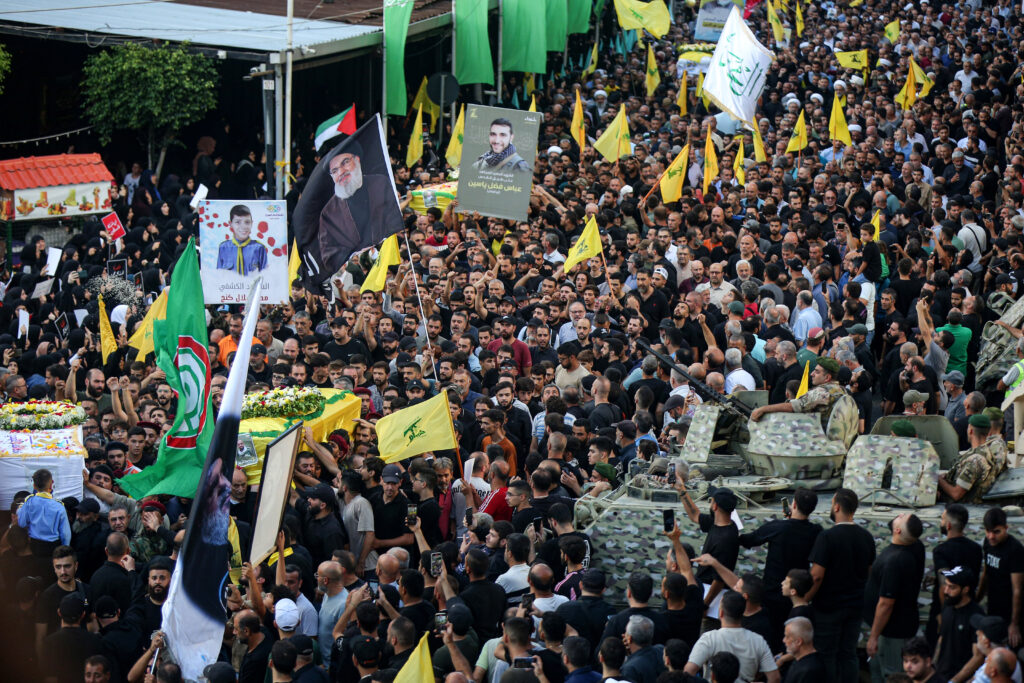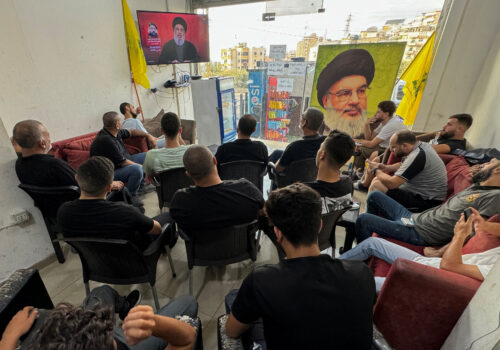Beep, beep, boom. Thousands were injured and dozens killed in Lebanon this week when beepers and walkie-talkies used by Hezbollah exploded in a coordinated manner on successive days. “We are opening a new phase in the war,” said Israeli Defense Minister Yoav Gallant, though Israel has not officially acknowledged that it was behind this operation. The attacks come as tensions are rising between Israel and Hezbollah, potentially opening up another front amid the war in Gaza. How did Israel (apparently) do it? And what does it mean for the Middle East conflict? Our experts messaged in with the answers.
Click to jump to an expert analysis:
Jonathan Panikoff: Hezbollah faces a psychological blow as it tries to avoid instigating a war
This master class in covert action is an escalation meant to de-escalate this conflict
The operation was a master class in covert action, both from the kinetic and supply chain aspects.
In fact, this is the most impressive kinetic intelligence operation I can recall in my career. The scale and scope of it was just staggering. It was not a decapitation strike against leadership figures, but more of an incapacitation strike, bringing Hezbollah to its knees by injuring hundreds of Hezbollah members in a single strike—and then doing it again the next day.
Israel has now achieved complete intelligence domination over Hezbollah, from the July hit on Fuad Shukr, to the preemptive strikes that in essence prevented a wider war, and now this audacious operation. What an evolution for Israeli intelligence, as they have certainly rebounded after the disaster of October 7.
This likely will cause Hezbollah to undertake a brutal counterintelligence review, which may paralyze the group. No one will be trusted.
The supply-chain side of the operation appears to be quite extraordinary, as Israel took advantage of the Hezbollah move to pagers (think of The Wire), which ironically was designed to thwart Israeli signals intelligence collection. Israel apparently found this unique vulnerability—Hezbollah’s need to import pagers.
In my view, this operation may have been designed to send a message—not necessarily the traditional operational prep of the environment operation, which would have signified the beginning of an Israeli ground move into Lebanon. Instead, this may have been part of the Israeli strategy of “escalate to de-escalate.” In other words, by delivering a devastatingly stark and brutal warning to Hezbollah that it has totally compromised its security, Israel signifies to the group that a wider war would be disastrous.
—Marc Polymeropoulos is a nonresident senior fellow in the Forward Defense practice of the Atlantic Council’s Scowcroft Center for Strategy and Security. He worked for twenty-six years at the CIA before retiring in July 2019 at the senior intelligence service level.
Hezbollah faces a psychological blow as it tries to avoid instigating a war
The planning and execution of the pagers operation on Tuesday, and the walkie-talkies operation on Wednesday, almost certainly took months of effort by Israel. There is a very real potential that it could raise tensions further, and the operation absolutely could be a prelude to war. But for Israel, it may also be an effort to try and convince Hezbollah that an invasion is imminent, regardless of whether one is or not, in hopes that the group—which almost certainly does not want a full-scale war with Israel—finally moves back ten kilometers from the border. This would enable tens of thousands of northern Israeli families to return to their homes after almost a year away because of the threat posed by the group.
At the same time, this strike did not just hit Hezbollah leaders but the rank and file of the terrorist organization. As a result, it would not be a surprise to see a lot of the Hezbollah rank and file clamoring to respond. But for Hezbollah to admit that these attacks were this wide of a counterintelligence failure would be bad for the group—not to mention dangerous to its survival.
Hezbollah leaders are desperate not to be seen as the ones instigating a war with Israel. Memories of the devastating 2006 war still loom large, and Hezbollah Secretary-General Hassan Nasrallah and Deputy Secretary-General Naim Qasim won’t want to give an excuse for global blame to be shifted from Israel—over Gaza or a potential invasion of Lebanon—to Hezbollah itself because it is viewed as striking Israel in a manner beyond what’s been occurring for the last eleven-plus months. That creates a conundrum for the group at a time when its internal credibility is going to be diminished given the psychological impact of its rank-and-file members, not just its leaders, being reminded that Israel can get them anytime, anywhere.
—Jonathan Panikoff is the director of the Atlantic Council’s Scowcroft Middle East Security Initiative. He is a former deputy national intelligence officer for the Near East at the US National Intelligence Council.
Hezbollah losing its ability to communicate is a win for Israel—and a loss for global intelligence agencies
The spontaneous combustion of Hezbollah communications equipment is helping intelligence communities around the world map the relationships and reach of a US-designated terrorist organization with global reach—across Lebanon into Syria and Yemen, from Iran’s ambassador to Lebanon to (according to my contacts) high-ranking Lebanese officials. Intelligence communities are filling in gaps in their matrices, narrowing in on new neighborhoods for collection, trying to make the most of this momentary flash of light on a dark network map, making hay while the sun shines.
But the same intelligence communities are quietly cursing under their breath. Because as quickly as Hezbollah’s detailed network was illuminated, it will go dark. It will cause planners and fighters in Iran’s Axis of Resistance to put down their phones around the region. If you are a smuggler or drug dealer conscripted by Hezbollah in exchange for safe passage through the Syrian border, you have the perfect excuse right now to ignore their calls and not show up for duty. There are likely mothers of young men in Syria purging their sons’ rooms of everything with a battery, diamond traders in West Africa tossing phones down mine shafts, and money launderers in Latin America tossing phones off yachts. Without warning from Israel that this operation would take place, intelligence services that may have invested years in hacking the communications networks of criminals and operatives on their watch lists will have their feeds cut off.
Communications are central to command and control; Hezbollah has effectively lost the ability, at least temporarily, to mobilize large numbers of fighters. Spooked and unreachable fighters will stay home or be forced to meet in clusters to coordinate, creating new targeting opportunities for drone strikes. Several thousand fighters are missing trigger fingers or worse. These create favorable conditions for potential operations by the Israel Defense Forces designed to push Hezbollah farther from Israel’s northern border. This is currently the subject of debate among Israeli leadership and the voices invited to weigh in are not limited to the war cabinet that has called the shots in Gaza, reflecting recognition that there is a lot at stake in such a decision.
The negative psychological impact of this operation on Hezbollah’s rank and file and its reputational impact on the group and Iran’s Axis of Resistance are unquantifiable but undoubtedly significant.
—Kirsten Fontenrose is a nonresident fellow at the Scowcroft Middle East Security Initiative in the Atlantic Council’s Middle East Programs. She was previously the senior director for the Gulf at the National Security Council.
Further reading
Tue, Sep 17, 2024
This is not the time for the United States to go soft on Hezbollah
New Atlanticist By
If Israel decides on a major campaign in Lebanon to remove the threat from Hezbollah, the US should have its ally's back.
Sun, Aug 25, 2024
After a failed attack, Hezbollah’s propaganda seeks to prevent a wider war with Israel
MENASource By
Committed as Hezbollah is to saving its Gaza-based allies, the group does not currently want a full war with Israel.
Mon, Jul 15, 2024
An increasingly thin blue line between Israel and Lebanon
MENASource By
The specter of a full-scale war between Israel and Hezbollah looms large.
Image: Hezbollah supporters carry the coffin of a victim who was killed in the electronic pagers explosion, during a funeral procession in a southern suburb of Beirut. Thousands of people were wounded in the attack and twelve were killed so far in the latest toll announced by the ministry of health. Hezbollah has blamed Israel for the detonations on 17 September and promised retaliation. Several of its fighters, as well as high-ranking representatives and members of the Radwan Force, an elite unit within the group, are said to be among the victims. Marwan Naamani/DPA.



